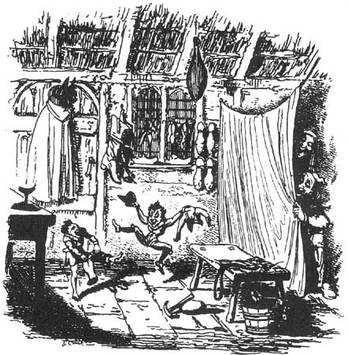|
In many stories, brownies are helpful little sprites who are eager to work and clean for human families. However, if clothes are left out, the brownie vanishes, never to be heard from again. And they'll usually announce this in rhyme. But why? The explanation varies by story. Some brownies are thrilled to find their new clothes. In fact, it seems to go to their head a little. In the German story of The Elves and the Shoemaker, the elves sing, "Now we are boys so fine to see, Why should we longer cobblers be?" In a similar tale, the household fairy's cry is, "Pixie fine, Pixie gay, Pixie now will run away." More often, though, it is simply a taboo and even the best way to drive off an unwanted brownie. "Here’s a cloak and here’s a hood! The Cauld Lad of Hilton will do no more good!" Another rhyme goes, “Gie Brownie coat, gie Brownie sark, Ye'se get nae mair o' Brownie's wark!” In some variations they'll leave if you pay them anything – food counts too. Keightley's Fairy Mythology explains that Brownies do their work out of generosity and are greatly turned off by anything that would look like payment or a bribe. (And in some places, like Berwickshire, England, it's less voluntary and they simply cannot take payment, being appointed by God to be the pro bono "servants of mankind".) However, they’ll accept gifts that are given discreetly. Clothes or fancy food are too much, but a simple bowl of cream and honeycomb left quietly somewhere out of the way will be gladly accepted. He gives an example of a woman making an outfit for her brownie and making the mistake of calling out to let him know it’s there. This prompts him to say, “A new mantle and a new hood; Poor Brownie! ye'll ne'er do mair gude!” Often the implication is that the brownie is deeply insulted by the gift - as with Puck, who would "chafe exceedingly" at the compassion of those who laid out clothes alongside the milk and bread he preferred. "What have we here? Hemton hamten, here will I never more tread nor stampen." Alternately, in The mad Pranks and merry Jests of Robin Goodfellow, a maid makes the mistake of leaving him a waistcoat instead of food. Big problem. Because thou layest me himpen hampen I will neither bolt nor stampen: 'Tis not your garments, new or old, That Robin loves: I feel no cold. Had you left me milk or cream, You should have had a pleasing dream: Because you left no drop or crum, Robin never more will come. (Keightley 288) In "hempen hampen," hemp would be the coarse cloth that the clothes are made from. This may link to another variant, where the brownie is fine with the idea of clothes - it's the shoddy material that offends him. In a Lincolnshire version, the brownie announces, “Had you given me linen gear, I would have served you many a year.” Another explanation is that giving him clothes says you’ve seen him. You would have to wait up late at night and spy on him to know what he's wearing. He's happy with his rags, thank you very much. On the other hand, in a tale from the Scottish Highlands, the brownie welcomed the idea of clothes and would regularly make bargains with the house-servants. The agreement was for him to do the winter’s threshing in exchange for a coat and hood that he liked. However, when they laid out the clothes ahead of time, and he grabbed them and took off, with the words “Brownie has got a cowl and coat, and never more will work a jot" (Keightley). Most of these are either gleeful and self-satisfied, or insulted and angry. However, in one story the brownie sounds quite sad. On the Isle of Man, the story is that a brownielike creature called the Phynnodderee helped in moving some stones. The grateful owner left some clothes for him in the glen where he lived. Upon finding them, the Phynnodderee cried, Cap for the head, alas, poor head! Coat for the back, alas, poor back! Breeches for the breech, alas, poor breech! If these be all thine, thine cannot be the merry glen of Rushen. (Keightley) This has stuck around in popular culture. In the Harry Potter series, house elves can be freed from servitude by a gift of clothing. A summary of reasons why:
SOURCES
Text copyright © Writing in Margins, All Rights Reserved
0 Comments
Leave a Reply. |
About
Researching folktales and fairies, with a focus on common tale types. Archives
July 2024
Categories
All
|
Writing in Margins

 RSS Feed
RSS Feed
